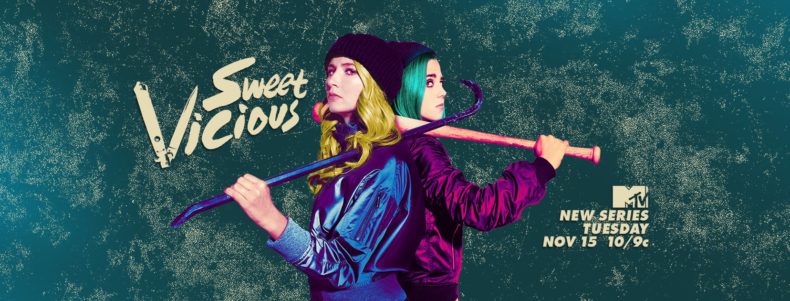

The world of television is filled with diverse genres and themes with each show providing their audience with a unique viewing experience. That being said, it can be difficult to find a television show that deals with real-world issues in a way that not many have. While I enjoy fantasy, sci fi and action as much as the next person, what I enjoy even more is seeing a network provide a narrative that others are afraid to speak about. As far as we have come over the years in terms of equal representation and breaking stereotypical character tropes, the simple fact is that many networks are afraid to branch out in fear of losing the ever so important ratings. Most clamor for a theme that is already popular and they add their spin to it in a seemingly perfect formula for success. This makes it incredibly difficult to find something truthfully unique. Naturally, you can imagine my delight when I saw an advertisement for a show that would finally break boundaries by addressing the serious issue of sexual assault. Most networks deliberately avoid storylines involving rape and sexual assault in order to prevent such a controversial topic from impacting their ratings. MTV’s Sweet/Vicious is an exception to this typical behavior, and I’m shocked that it took Hollywood this long to explore this narrative.
In November of 2016, Sweet/Vicious premiered on MTV and I was instantly captivated. The premise of the show, for those of you that may not know (but definitely should discover), is centered around college students Jules Thomas and Ophelia Mayer, played by Eliza Bennett and Taylor Dearden respectively. Jules is a survivor of sexual assault dedicated to giving other survivors the justice that she did not get and Ophelia is a brilliant mind that lacks a true purpose. When the two cross paths on a chance encounter, their worlds become intertwined in pursuit of justice. Jules and Ophelia become their campus’ resident vigilantes, locating rapists that have assaulted people on their campus and surrounding areas, tracking them down and giving them a beating in hopes of teaching them a lesson about consent.
If that concept alone hasn’t caught your attention, let me expand on the details of the series while avoiding spoilers. Not only is Sweet/Vicious broaching territory that few are brave enough to present on television, they also break down the tropes that so many cling to. Jules is a sorority girl and on television these women are typically presented in one way: vain, pretentious and self-involved. Jules is strong both physically and mentally and everyone in her sorority seems to be a down-to-earth person that only wants the best for everyone. Ophelia’s bright hair and tendency to turn to recreational drugs to wind down and turn a profit would normally paint her as a delinquent with no future on any other show. On the contrary, Ophelia has a brilliant mind and a fiercely confident personality. Dynamic characters like these and the other supporting characters are what viewers need to expand their mindset and understand that everyone is different and judgement should not be passed at first glance.
Going back to sexual assault, the core message of the show is not to just receive justice. The deeper meaning is the message that sexual assault does not define you. Jules spends the first season of the show struggling to cope and come to terms with what has happened to her. Along the way, thanks to those close to her and her own self-journey, she begins to realize that she is not damaged or broken and that she can be whoever she wants. You are not what has happened to you and though the healing process may be a long journey and vastly different for everyone, you can rise above it and reclaim your mind and body.
It is statistically proven that young women on college campuses are the most likely to be sexually assaulted. As someone who is a part of that demographic, the concept is terrifying. I know people personally that have been sexually assaulted and the general consensus is that they never received the justice they deserved. Every day of their lives, these people carry the emotional weight of what has happened to them and in far too many cases, the people that attacked them get to live their lives as if the event never occurred. Many victims do not even report their attacker in fear that their reputation will be tarnished or that their attacker will harm them again. Those that do face judgement from the world. If a woman states that she was raped, she may hear questions such as “Well what were you wearing?” and “Were you drinking?”. The truth of the matter is that no matter what a person is wearing, how they behaved earlier or what they have consumed, they are the only one entitled to giving you consent to touch them. No means no and there are more ways than one to say no. No circumstance you can possibly think of gives you the right to touch another person against their will. This goes for men and women because women are not the only ones that can be sexually violated.
For a moment, I want you to think back to the last time you remember seeing a storyline involving rape on your television screen. For some of you, there may be no answer. For those that do have an answer, can you honestly say that you properly got a chance to see the emotional damage it can cause someone? What about the rapist? Did they receive a proper punishment? Every single episode of Sweet/Vicious has addressed these issues. Our society will not change unless we make it change. Change doesn’t just happen: there has to be a spark. Awareness is that spark. The more awareness that we bring to this serious issue, the more we can open the eyes of the public. Only then can we see real changes being made to our justice system in regards to sexual assault.
In closing, I just want to take a moment to genuinely thank the creators, actresses and actors behind Sweet/Vicious. You all put your hearts into shining a light on a genuine issue. Thank you to MTV for taking a chance that not many would. Sweet/Vicious concluded its first season in a way that opens the potential for so many more stories to be told. It is my genuine hope that it continues to have a chance to break barriers and give the world insight into a justice system that is broken but can be repaired.



